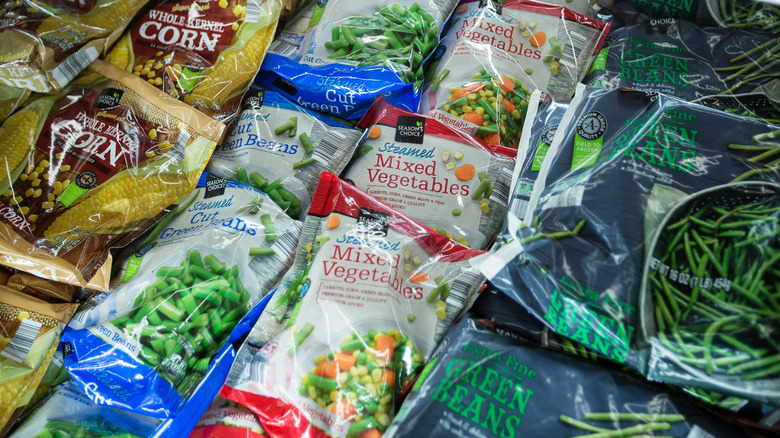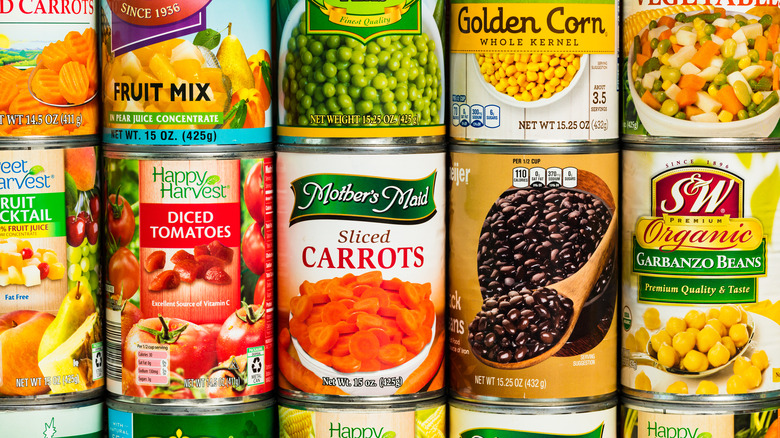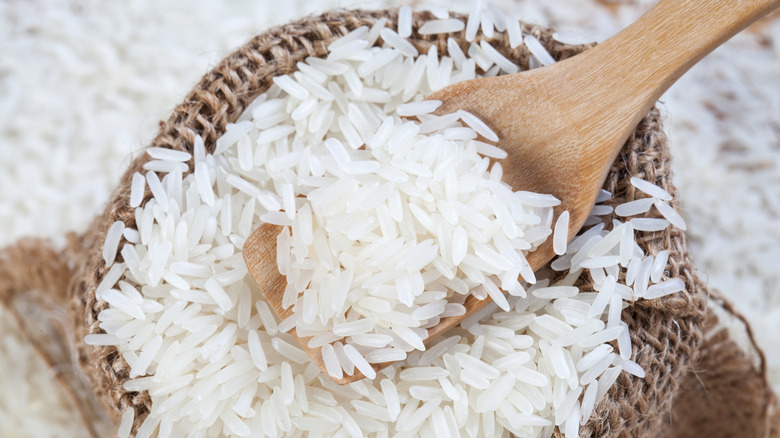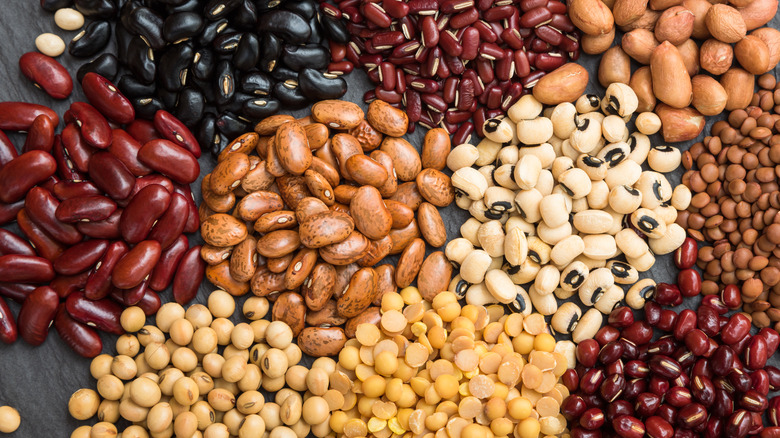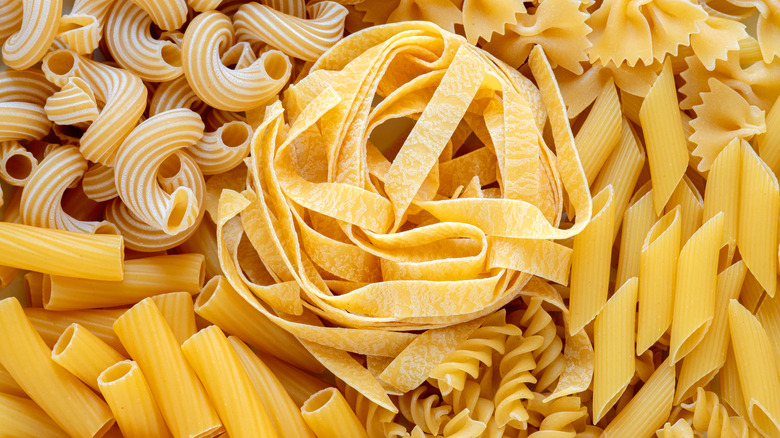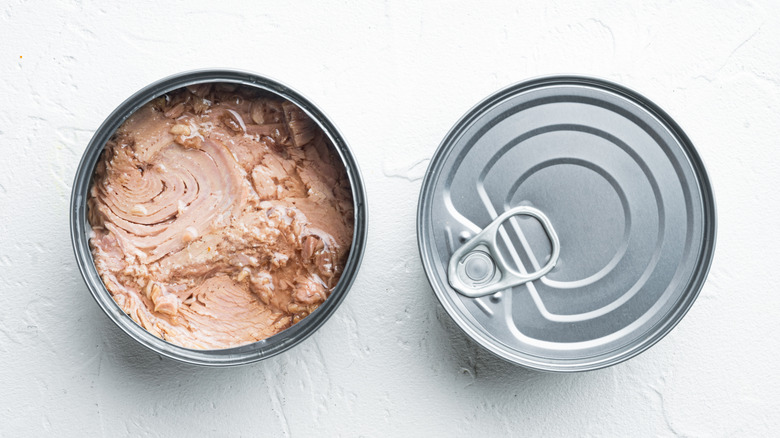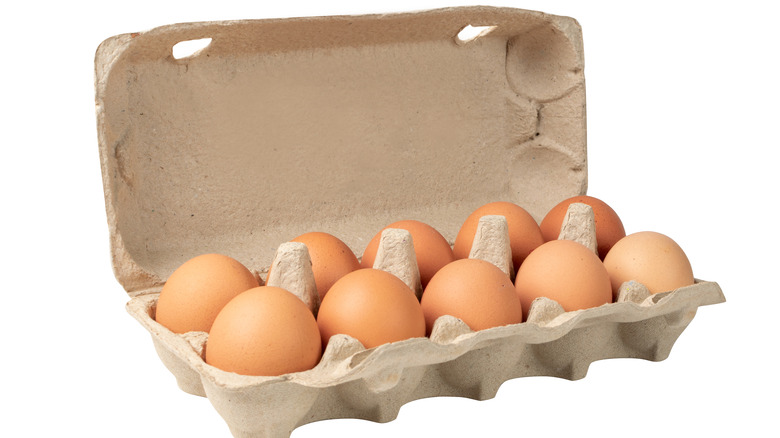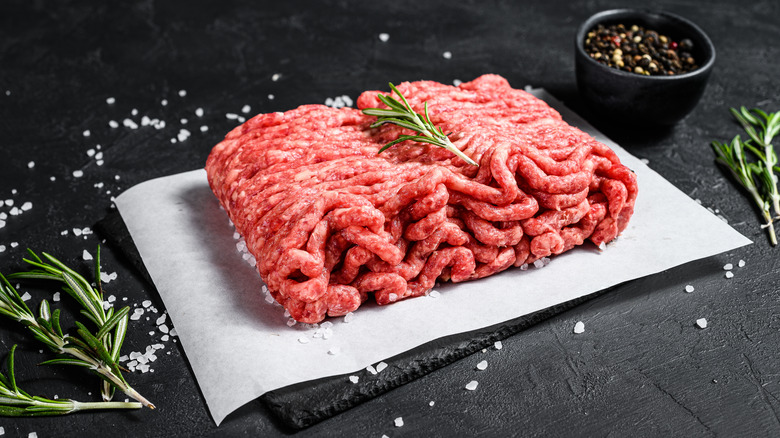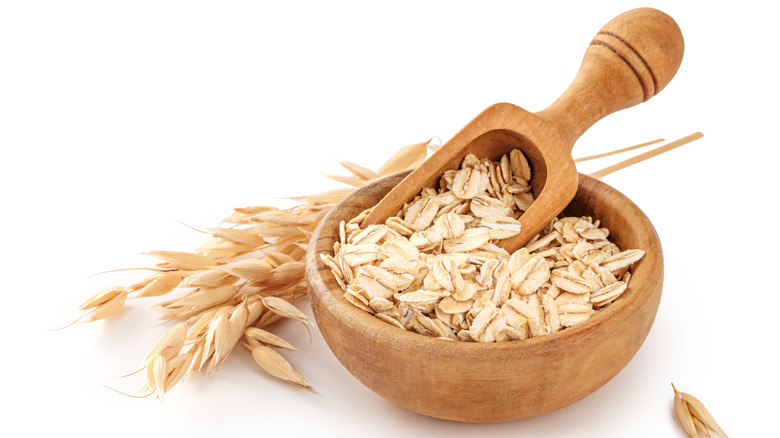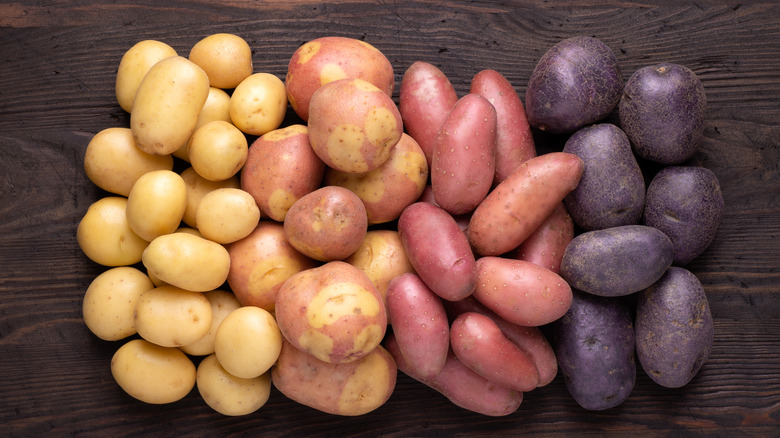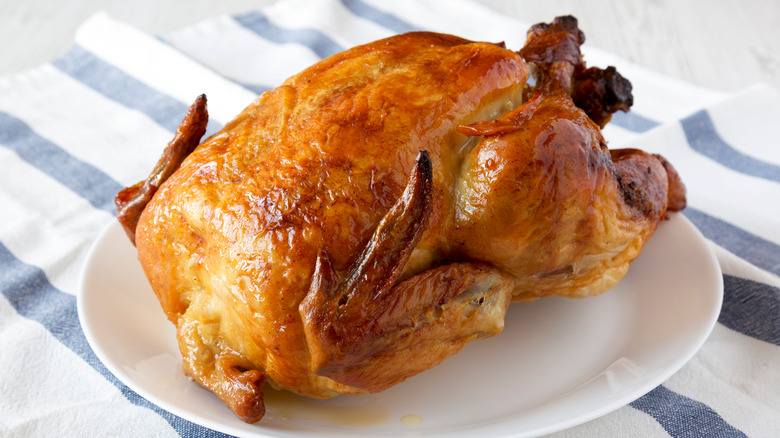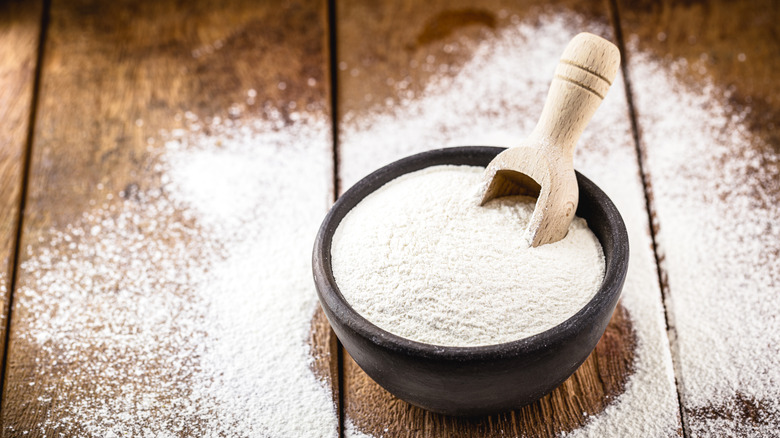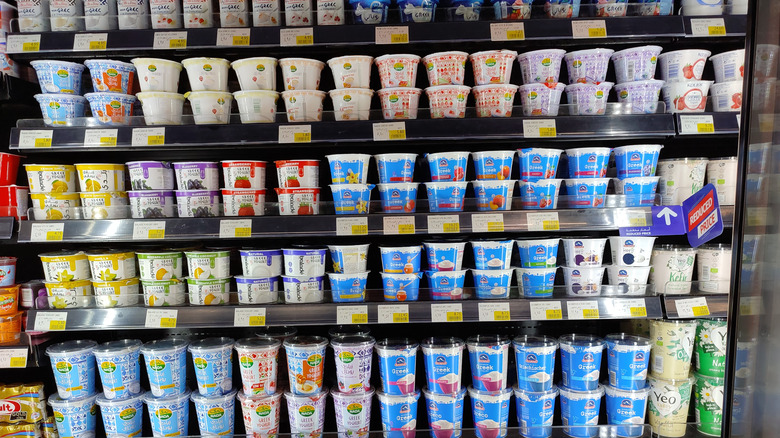Affordable Healthy Foods You Can Find In Any Grocery Store
So, you're trying to eat healthier than you have been, but you still want to save money on your grocery bill? Sounds like a great goal for just about everyone. But if you're trying to cut your spending, it can seem difficult to pick out the healthiest options at your local grocery store. A bagged salad costs how much?! But believe it or not, there are healthy and affordable options out there waiting for you ... if you just know what you're looking for. While, yes, these foods may require a bit more prep time, they will help you stay healthy without annihilating your wallet. And who doesn't like to take on a cooking challenge from time to time?
We've put together a shopping list of some of the must-have foods to buy if you're trying to save money but still want to eat well. Some of it is stuff you've undoubtedly tried before, but others may be new additions to your weekly shopping list. Keep an open mind, find new recipes to utilize unfamiliar ingredients, and don't forget to indulge at least a little bit every week. You'll be feeling healthier (and hopefully richer!) in no time.
Frozen produce
You knew we were going to start with frozen veggies, right? They may not be everyone's favorite thing to eat — a lot of people think fresh tastes better — but if you're on a budget and you're trying to get plenty of veggies into your diet, buying frozen is a great hack. You're not sacrificing nutritional content: Because frozen veggies are picked at peak freshness, they retain their nutrients for months (via EatingWell).
It all comes down to choosing the right veggies and learning how to cook them in a way that preserves their flavor as much as possible. For example, if you opt for frozen spinach, you should make sure to thaw it and press as much water out of it as possible before adding it to dishes. When it comes to Brussels sprouts, you may want to roast them whole instead of trying to crisp the leaves.
And don't think that it stops at frozen veggies. Frozen fruit can be a bit more difficult to work with, but it's a great option for smoothies and may even work in some baked goods. Plus, you can stock up in the frozen produce aisle, and you won't have to keep going back to the store throughout the week to get more fresh produce. Who doesn't love a food that's healthy, affordable, and convenient?
Canned fruit and veggies
Now, it may go without saying that frozen produce is a solid option when you're trying to save money, but what about canned? Canned veggies have some haters, but that doesn't mean you shouldn't give them a try. According to the Food Network, canned fruits and vegetables "can absolutely be just as healthy (if not more) than its fresh counterpart." Some canned veggies can be kind of lackluster (looking at you, carrots), but others are delicious. Canned corn, for example, can be added to a ton of recipes for a burst of added color, and canned tomato paste is an essential pantry item that's even easier to cook with than fresh tomatoes.
There are a ton of canned fruits that we love, like canned peaches and canned mandarins. Since fruit can be so cost-prohibitive, especially when you purchase it out of season, it just makes sense to have some canned fruit on hand for whenever you need something nice and juicy. We recommend opting for fruit stored in water instead of syrup if you're trying to stick to the healthy stuff.
Rice
Rice has gotten a bad rap in recent years, as carbs have gone out of fashion and fat is back in vogue. But let's get one thing straight: Rice isn't an unhealthy food. That's especially true if you choose brown rice, which, according to the Kendall Reagan Nutrition Center at Colorado State University, is especially nutritious. However, that doesn't mean you have to write off white rice completely. It also has plenty of nutrients, and it cooks faster, which might make your meal prep a bit simpler. And the best part? Rice is one of the cheapest ingredients you can find at any grocery store.
Rice is a blank slate food — it goes well with just about anything else you have in your fridge of your pantry. Pair it with beans and veggies for a dish that's pretty much always delicious, or add some chicken and gravy if you want an easy, comforting meal.
Moral of the story? Don't write off rice as an unhealthy food that has no place in your cart when you're trying to feel your best. Enjoy all the foods you love in moderation, including, yes, white rice. Your taste buds will thank you for it.
Beans
Beans are the essential budget food. They're cheap, filling, and, most importantly, super nutritious. If you're the kind of person who thinks beans are boring, we've got news for you: There are so many different kinds of beans out there, you're bound to find some that you love. Plus, even if you don't like beans on their own, you can use them to make a wide variety of dishes. Black bean burgers for dinner, anyone? You can also add them to staple grains like rice or quinoa for an easy, complete meal that's packed with plant-based protein.
Healthline touts the health benefits of beans: They pack in plenty of protein, may aid in weight loss, and can provide benefits to your heart. Sure, beans can cause digestive problems for some, but if you don't fall into that camp, you should make sure to stock up the next time you visit the grocery store. Dried beans tend to be less expensive, but they take some time to prep, so they may not be best if you're always in a hurry to throw dinner together. Canned beans require less work but tend to be slightly pricier. It's up to you to choose the best option for your dinner tonight.
Pasta
Okay, okay. We know what you're thinking: There's no way pasta can be considered healthy. And we admit that it may not be something you want to eat for every single meal. But pasta can be included in a healthy diet when you eat it in moderation, and we don't want to give up that carb-y goodness in our diets. Plus, when you're trying to save money on groceries, it makes sense to pick up a few options that give you some concentrated calories and carbs, a task that pasta is perfect for.
Generally, plain white pasta is going to be a little less expensive than the whole-grain stuff and a lot less expensive than the gluten-free stuff, so if that's a concern, it's something you should keep in mind when you're planning your budget. Otherwise, buy that pasta, pair it with a homemade sauce, throw in some extras (maybe canned beans? Frozen veggies?), and enjoy.
Canned fish
Don't roll your eyes in disgust just yet. While canned fish, like tuna, has a bad reputation in some circles, that doesn't mean that you shouldn't pick up some cans the next time you go to the grocery store. First of all, canned tuna is packed with protein, and as WebMD notes, tuna is one of the best food sources of vitamin D. Most cans of tuna are also inexpensive. Since it's a shelf-stable food, you don't have to worry about it going to waste before you can get to it. And while it may not taste amazing on its own, it's delicious when it's combined with other ingredients, like pasta. Canned tuna also makes an excellent addition to a quick salad. We prefer the flavor of canned tuna in oil, but it tends to be cheaper when it's stored in water.
Of course, you can always try other kinds of canned fish, like salmon or sardines. These options can also be a part of a healthy diet. However, keep in mind that these types of fish may be more expensive than tuna.
Eggs
Eggs are great for breakfast, of course, but don't limit yourself to one egg-filled meal a day. They can be included in so many different recipes, and they offer plenty of protein, so they're a no-brainer when it comes to healthy grocery shopping on a budget. You can serve them on their own with your breakfast, add to a salad for some extra flavor, or even use in baking. Whether you're shopping on a budget or not, eggs are a staple in many people's kitchens.
Some worry that eating too many eggs can be harmful to their health, and we totally understand the concern. Eggs are high in cholesterol, but according to the Mayo Clinic, it doesn't appear as if the cholesterol found in eggs is detrimental to human health, unlike the cholesterol found in many other animal foods. Eating up to seven eggs in a week shouldn't be a problem for most people, so make sure to pick up a dozen eggs the next time you go grocery shopping.
Ground meat
When you're shopping on a budget, there's one category of foods that seems to threaten to break it every time: meat. The meat aisle can be an intimidating place if you're trying to hold on to some of that hard-earned cash in your wallet. But knowing what kinds of meat to shop for can ensure you have enough protein for the week. If you want to save, buy ground meat. Ground beef, chicken, turkey, and pork are all solid options, and they tend to be less expensive than other cuts. Since they're so versatile, you can use them in countless recipes, whether you're making burgers or a clean-out-the-fridge stir fry.
Don't be afraid to switch it up. If you usually buy ground beef, sub in chicken or turkey for a week. You may just find that the change offers some extra excitement in your diet. Because ground meat packs plenty of protein, this addition to your meals will help keep you fuller for longer. If you're really trying to save money, use beans for protein and use just a little bit of meat to add flavor.
Oats
According to Eat This, Not That, oats are one of the healthiest whole grains. Luckily for you, they're also some of the cheapest, which means they should be on your budget shopping list. Seriously, if you're not already eating oats, what are you doing? It's hard to find a more cost-effective breakfast (or even lunch or dinner) option, and they have a long list of health benefits, including the ability to lower your cholesterol, improve blood sugar control, and even potentially assist with weight loss.
If you don't already love oats, we understand the hesitation. If you eat them on their own, they're kind of bland and uninteresting. Those little microwavable packets do not do oats justice. Looking to dress up your oats? Add plenty of other ingredients, like fruit, brown sugar, agave syrup, nut butter, cinnamon, or whatever else sounds good to you. And don't assume that you have to stick to the sweet end of the spectrum — some people prefer savory breakfast. There are plenty of savory oatmeal recipes on the internet, but you can always get creative and try coming up with your own. Whatever you do, don't forget to pick up some oats!
Potatoes
One of the most fillings foods you can find at the grocery store — and therefore one of the most cost-effective — are potatoes. They are high in calories and carbs, but that doesn't mean you have to eliminate them from a healthy diet. Rather, it just means that they should be consumed in moderation. Healthline even explains that potatoes offer a wide variety of health benefits. Not only are they full of nutrients we need to survive, but they also boast plenty of antioxidants and the ability to help your digestive system due to their resistant start. And if you're on a gluten-free diet? They're the natural pasta replacement you've been looking for.
We love potatoes from a budget viewpoint because they're cheap — you can get a huge bag of them for just a few bucks, sometimes less. If you keep them in a cool, dark space, they'll last a long time. And since they're so filling, you don't have to add many potatoes to your diet to sate your appetite. With so many delicious potato possibilities — fries! hashbrowns! latkes! — there's no reason not to have some on hand.
Rotisserie chicken
We know a rotisserie chicken isn't in every shopper's budget, especially if you're really trying to cut back on your spending. But time is money, and if you're trying to save it so you can focus on other things, a rotisserie chicken is the way to go. You may be surprised at how much meat comes off a rotisserie chicken, but you can stretch it for several meals by including it in soups, salads, sandwiches, and whatever else you whip up. And since you don't even have to spend time cooking it, you can grab it on your way home from work and have dinner and the next day's lunch planned with minimal prep work.
If you live alone or with just one other person, you may be intimidated by tackling a whole rotisserie chicken in a week. No problem — just clean the chicken and freeze it. That way, you have chicken ready to go whenever you need it. This is one of those grocery store hacks we'll come back to time and time again because it's just that good.
Flour
Sounds basic, and it is. But flour is a staple in many people's diets, and it's one of the most cost-effective ingredients you can buy at the grocery store. The only problem? It generally requires a bit of prep work. However, if you have some extra time on your hands and don't mind spending it in the kitchen, having flour on hand is always a good idea. Of course, you can use it to make homemade bread, pasta, and other baked goods. But it can also be used as a thickener in many recipes. While you may not think of flour as a healthy food, per se, it can help you make healthy foods you may not otherwise want to spring for.
Of course, not all flours are created equally. White wheat flour will probably be the cheapest, but whole wheat flour shouldn't be too far off. Other flours that may be more expensive include coconut, almond, and cassava flour, which are also healthy choices that may be more appropriate for those following a gluten-free diet.
Yogurt
Yes, buying the individual packages of yogurt can be expensive, maybe prohibitively so if you're on a budget. But that doesn't mean you have to cut this staple out of your diet altogether. Buying the bigger containers tends to be less expensive than buying the individual cups, so you get more bang for your buck. And considering how healthy yogurt is, you're definitely going to want to take advantage of all the nutritional benefits it offers.
Since yogurt is a milk product, you're going to get the benefit of all that protein you usually find in milk. But it goes further than that. Yogurt also contains probiotics, which may improve your gut health, per WebMD. There is also some preliminary evidence that it may boost your immune system.
Your options for yogurt certainly aren't limited either. You can have it for breakfast with some fruit and a sweetener, or you can add it to other dishes to add richness and acidity. If you're looking for the latter, just make sure you look for plain Greek yogurt — the other stuff isn't going to cut it.

